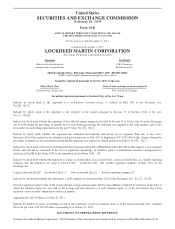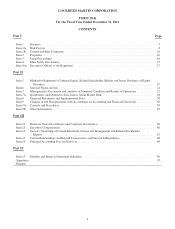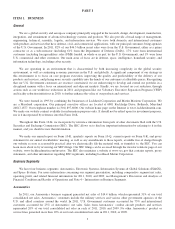Lockheed Martin 2011 Annual Report Download - page 19
Download and view the complete annual report
Please find page 19 of the 2011 Lockheed Martin annual report below. You can navigate through the pages in the report by either clicking on the pages listed below, or by using the keyword search tool below to find specific information within the annual report.competitive bidding process entails substantial costs and managerial time to prepare bids and proposals for contracts that
may not be awarded to us or may be split among competitors. Following award, we may encounter significant expenses,
delays, contract modifications, or even loss of the contract if our competitors protest or challenge contracts that are awarded
to us. Multi-award contracts require that we make sustained efforts to obtain task orders under the contract. We are facing
increased competition, particularly in information technology and cyber security, from non-traditional competitors outside of
the aerospace and defense industry. At the same time, our customers are facing budget constraints, trying to do more with
less by cutting costs, identifying more affordable solutions, and reducing product development cycles. To remain
competitive, we consistently must provide superior performance, advanced technology solutions, and service at an affordable
cost and with the agility that our customers require to satisfy their mission objectives.
International sales may pose different risks.
In 2011, our sales to international customers (including foreign military sales funded, in whole or in part, by the U.S.
Government) were 17% of net sales. As a company, we have a goal to grow international sales over the next several years.
Our international business may pose risks that are different, and potentially greater, than those encountered in our domestic
business due to the potential for greater volatility in foreign economic and political environments. International procurement
rules and regulations, contract laws and regulations, and contractual terms are different from those in the U.S., and may be
interpreted differently by foreign courts. Our international business is highly sensitive to changes in foreign national
priorities and government budgets, and may be further affected by global economic conditions and fluctuations in foreign
currency exchange rates. Sales of military products are affected by defense budgets (both in the U.S. and abroad) and U.S.
foreign policy.
In 2011, the European Commission took actions to stem the debt crisis in a number of member countries of the
European Union and to stabilize the economies of these countries. The governments of a number of European countries have
proposed austerity measures to their budgets as a condition for continued economic support from other European Union
countries (as well as the Europe Central Bank) which could further constrain their defense budgets and fiscal priorities in
current and future periods. Given the ongoing negotiations of the European Commission and its member nations, the effect of
these austerity measures on our international sales is uncertain.
Sales of our products and services internationally are subject to U.S. and local government regulations and procurement
policies and practices including regulations relating to import-export control. Violations of export control rules could result
in suspension of our ability to export items from one or more business units or the entire Corporation. Depending on the
scope of the suspension, this could have a material effect on our ability to perform certain international contracts. There also
are U.S. and international regulations relating to investments, exchange controls, taxation, and repatriation of earnings, as
well as currency, political, and economic risks. We also frequently team with international subcontractors and suppliers who
are exposed to similar risks.
In international sales, we face substantial competition from both domestic manufacturers and foreign manufacturers
whose governments sometimes provide research and development assistance, marketing subsidies, and other assistance for
their products.
Some international customers require contractors to comply with industrial cooperation regulations and enter into
industrial cooperation agreements, sometimes referred to as offset agreements. Offset agreements may require in-country
purchases, manufacturing, and financial support projects as a condition to obtaining orders or other arrangements. Offset
agreements generally extend over several years and may provide for penalties in the event we fail to perform in accordance
with offset requirements. See “Contractual Commitments and Off-Balance Sheet Arrangements” in Management’s
Discussion and Analysis of Financial Condition and Results of Operations.
Our business involves significant risks and uncertainties that may not be covered by indemnity or insurance.
A significant portion of our business relates to designing, developing, and manufacturing advanced defense and
technology systems and products. New technologies may be untested or unproven. Failure of some of these products and
services could result in extensive loss of life or property damage. Accordingly, we also may incur liabilities that are unique to
our products and services, including combat and air mobility aircraft, missile and space systems, command and control
systems, air traffic control management systems, cyber security, homeland security, and training programs. In some, but not
all circumstances, we may be entitled to certain legal protections or indemnifications from our customers, either through U.S.
Government indemnifications under Public Law 85-804, qualification of our products and services by the Department of
Homeland Security under the SAFETY Act provisions of the Homeland Security Act of 2002, contractual provisions, or
11
























